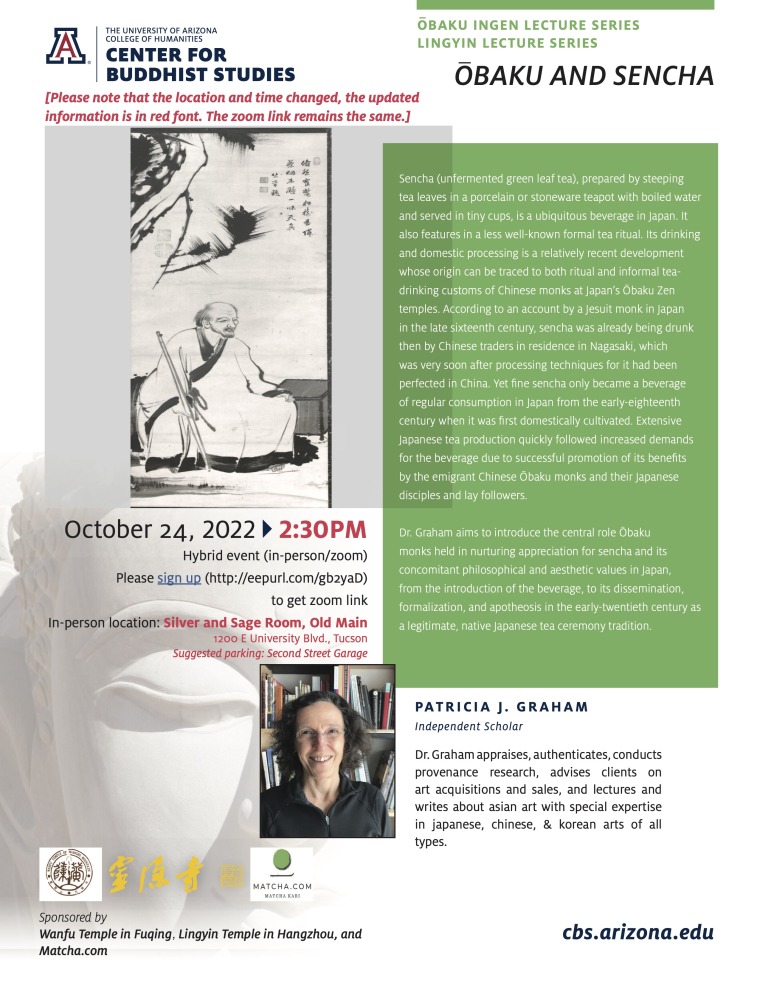[𝙄𝙢𝙥𝙤𝙧𝙩𝙖𝙣𝙩 𝙪𝙥𝙙𝙖𝙩𝙚𝙙: The in-person location and time of Dr. Graham’s lecture have been changed to 𝟮:𝟯𝟬 𝗽𝗺 𝗼𝗻 𝗢𝗰𝘁. 𝟮𝟰 𝗶𝗻 𝗦𝗶𝗹𝘃𝗲𝗿 𝗮𝗻𝗱 𝗦𝗮𝗴𝗲 𝗥𝗼𝗼𝗺, 𝗢𝗹𝗱 𝗠𝗮𝗶𝗻. The zoom link remains the same.]
Dear Friends of the Center for Buddhist Studies,
Please join us on October 24th at 2:30 pm in Silver and Sage Room, Old Main for the next lecture of Ōbaku Ingen/Lingyin Lecture Series of the term! This is a hybrid event (in-person/zoom). To receive a link to the webinar, please sign up for our email list here: http://eepurl.com/gb2yaD. If you are already on our list of “Lectures and Academic Research,” you will receive the link soon.
Speaker: Dr. Patricia Graham (Independent Scholar)
Talk title: “Ōbaku and Sencha”
Abstract:
Sencha (unfermented green leaf tea), prepared by steeping tea leaves in a porcelain or stoneware teapot with boiled water and served in tiny cups, is a ubiquitous beverage in Japan. It also features in a less well-known formal tea ritual. Its drinking and domestic processing is a relatively recent development whose origin can be traced to both ritual and informal tea-drinking customs of Chinese monks at Japan’s Ōbaku Zen temples. According to an account by a Jesuit monk in Japan in the late sixteenth century, sencha was already being drunk then by Chinese traders in residence in Nagasaki, which was very soon after processing techniques for it had been perfected in China. Yet fine sencha only became a beverage of regular consumption in Japan from the early-eighteenth century when it was first domestically cultivated. Extensive Japanese tea production quickly followed increased demands for the beverage due to successful promotion of its benefits by the emigrant Chinese Ōbaku monks and their Japanese disciples and lay followers.
Dr. Graham has written extensively elsewhere about the development of the sencha tea ceremony, its role in facilitating the dissemination of Chinese cultural values to the broader populace, and the sociocultural mechanisms that facilitated its trajectory from a pastime of a small, elite group of Sinophile scholars into a formal tea ritual that is still practiced in Japan today. Here she aims to introduce the central role Ōbaku monks held in nurturing appreciation for sencha and its concomitant philosophical and aesthetic values in Japan, from the introduction of the beverage, to its dissemination, formalization, and apotheosis in the early-twentieth century as a legitimate, native Japanese tea ceremony tradition.
Speaker Bio:
Dr. Graham appraises, authenticates, conducts provenance research, advises clients on art acquisitions and sales, and lectures and writes about asian art with special expertise in japanese, chinese, & korean arts of all types. See her website for detailed information: http://www.patriciagraham.net
Save the Date for the next lecture:
Monday, Oct. 31, 2022, 4 pm (Arizona Time)
Talk Title: “Body as Image: Navigating Representations through Buddhist Exegesis”
Speaker: Rae Dachille (Assistant Professor, Religious Studies, University of Arizona)
These lecture series are made possible thanks to the generous support from Wanfu Temple in Fuqing, Lingyin Temple in Hangzhou, and Matcha.com. For more information about our lecture series, please visit our website: https://cbs.arizona.edu/event/2022-fall-lecture-series
We look forward to seeing you there!



